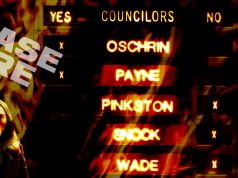 Let’s begin with some obvious takeaways from the first presidential debate last week.
Let’s begin with some obvious takeaways from the first presidential debate last week.
For Mitt Romney, the debate was a great success—he showed confidence, he demonstrated a mastery of the issues, and he seemed genuinely committed to tackling the nation’s toughest problems to restore the greatness of America.
Romney appeared, in a word, presidential. And many undecided voters are beginning to view him in that light. In one national poll, Romney now leads President Barack Obama by 2 percent among likely voters (he trailed Obama by 2 percent before the debate). Another national poll has Romney tied with the president after trailing by 9 percent prior to the debate. In many swing states, the race has tightened or tilted toward Romney—for example, Romney flipped a 5-percent deficit in Colorado into a 3.5-percent lead. And the money is pouring in as well—Romney raised $12 million in just 48 hours after the debate ended, and most of those donors had never given money to the campaign before. Momentum is on Romney’s side.
For Barack Obama, the debate was a disaster—he appeared detached, uncertain, and unconvincing in his vision for America.
Obama of course had to explain away his abysmal record thus far as president. In just 3 ½ years, Obama has added over $5.4 trillion to the national debt, bringing our total debt to over $16 trillion. He has asked Congress for increases to federal spending each year as president, despite promising “net spending cuts” to the federal budget in his 2008 presidential campaign. During the nation’s worst economic crisis since the Great Depression, Obama decided to push national health insurance reform through Congress. He promised that family insurance premiums would drop by $2,500 by the end of his first term as a result, but family premiums have actually increased by $3,000. To make matters worse, Obama’s economic policies have also led to the devaluation of the dollar, thereby raising commodity prices for every American family—the price of gas alone has skyrocketed, going from $1.84 when Obama took office to $3.81 today (and as high as $5 or more in some parts of the nation). Altogether, Obama’s record as president has been difficult to defend, and his poor performance in the debate last week further undermined his credibility as a competent leader going forward.
Now, let us shift our focus away from the presidential candidates for a moment and onto something more important yet almost forgotten in the last debate: our own Constitution. In a 90-minute debate about domestic issues, the Constitution was mentioned only once—by Mitt Romney. To his credit, Romney explained that the role of government is to “promote and protect the principles of” the Constitution and the Declaration of Independence. But I didn’t get the sense that these principles really factored into either candidate’s positions during the debate.
Sadly, the Constitution gets such little attention in politics today because the federal government has been exercising its excessive powers for such a long time. Many Americans have accepted the federal government’s expanded role in our society today because we have tolerated it for so long. But precedential tolerance of a federal power does not make it constitutional.
Our Founding Fathers expressly limited federal power in the Constitution because they understood the great danger to liberty that accompanies centralized power in any nation. Thomas Jefferson explained, “What has destroyed liberty and the rights of man in every government which has ever existed under the sun? The generalizing and concentrating all cares and powers into one body, no matter whether of the autocrats of Russia or of France, or of the aristocrats of a Venetian Senate.”
Our Constitution was designed in part to prevent the rise of a centralized power in America. Yet here we are in 2012 with a government that now has an unlimited power to tax, regulate, and spend. So, every 4 years, we tune into the presidential debates to learn, not how certain powers might comport with the Constitution, but instead how the presidential candidates will wield the federal government’s omnipotent power if elected. How will they tax us? What regulations will we have to comply with? How will they spend our money? And are they competent enough to manage the incredibly large bureaucracy known as the executive branch?
In effect, we are not choosing a president. We are choosing a master to whom we must submit for 4 years. Although we hold a semblance of power over our elected representatives, that elective authority matters little as long as government retains its broad power over the people. Thomas Paine explained, “It is not because a part of the government is elective, that makes it less a despotism, if the persons so elected possess afterwards, as a parliament, unlimited powers. Election in this case becomes separated from representation, and the candidates are candidates for despotism.”
In his 1835 book, Democracy in America, Alexis de Tocqueville made an insightful observation about the obedient attitude that often prevails among the people in a democracy of unlimited power. He wrote:
Our contemporaries are constantly wracked by two warring passions: they feel the need to be led and the desire to remain free. Unable to destroy either of these contrary instincts, they seek to satisfy both at once. They imagine a single, omnipotent, tutelary power, but one that is elected by the citizens. They combine centralization with popular sovereignty. This gives them some respite. They console themselves for being treated as wards by imagining that they have chosen their own protectors. Each individual allows himself to be clapped in chains because he sees that the other end of the chain is held not by a man or a class but by the people themselves.
In this system citizens emerge from dependence for a moment to indicate their master and then return to it.
There are many people nowadays who adjust quite easily to a compromise of this kind between administrative despotism and popular sovereignty and who believe that they have done enough to guarantee the liberty of individuals when in fact they have surrendered that liberty to the national government.
This is not the government that our Founding Fathers created, for James Madison wrote in 1788, quoting Thomas Jefferson, “‘An elective despotism was not the government we fought for.’” But this is the government we have today.
So the question is, what are we going to do about it? We can certainly press forward down our current course and watch our liberty continue to erode in time. Or we can begin taking a stand for liberty, which requires an understanding of our Constitution and the principles it was designed to preserve. (For starters, I recommend my book, The American Ideology: Taking Back our Country with the Philosophy of our Founding Fathers.) Armed with this knowledge, we can then act with confidence on our founding ideals and begin demanding that every politician honor his or her oath to the Constitution.
The Constitution is, after all, the closest manifestation of the will of the people. But until we start demanding that our will be served in government, the Constitution will continue to be just a footnote in any future presidential debate.
Visit Brian Vanyo at brianvanyo.com!







